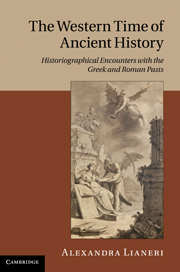Book contents
- Frontmatter
- Contents
- Acknowledgements
- Notes on contributors
- INTRODUCTION
- THEORISING WESTERN TIME: CONCEPTS AND MODELS
- 1 Time's authority
- 2 Exemplarity and anti-exemplarity in early modern Europe
- 3 Greek philosophy and Western history: A philosophy-centred temporality
- 4 Historiography and political theology: Momigliano and the end of history
- ANCIENT HISTORY AND MODERN TEMPORALITIES
- UNFOUNDING TIME IN AND THROUGH ANCIENT HISTORICAL THOUGHT
- AFTERWORD
- Bibliography
- Index
1 - Time's authority
from THEORISING WESTERN TIME: CONCEPTS AND MODELS
Published online by Cambridge University Press: 03 May 2011
- Frontmatter
- Contents
- Acknowledgements
- Notes on contributors
- INTRODUCTION
- THEORISING WESTERN TIME: CONCEPTS AND MODELS
- 1 Time's authority
- 2 Exemplarity and anti-exemplarity in early modern Europe
- 3 Greek philosophy and Western history: A philosophy-centred temporality
- 4 Historiography and political theology: Momigliano and the end of history
- ANCIENT HISTORY AND MODERN TEMPORALITIES
- UNFOUNDING TIME IN AND THROUGH ANCIENT HISTORICAL THOUGHT
- AFTERWORD
- Bibliography
- Index
Summary
Time and authority: how does time have authority? This is the question I would like to address. In “What is authority?” Hannah Arendt shed much light on the link between authority and the past. Authority, she reminded us, is Roman in both word and concept, while Greek political philosophy never established such a concept. For the Romans, what mattered was the foundation's sacred nature: auctores imperii Romani conditoresque, as Pliny put it, the initiators, founders and guarantors of Roman power. If we look at the etymology, authority is that which serves to “augment” the foundation, auctoritas relating to the verb augere (to augment, grow, increase): it is what makes things grow. And in the absence of that first authority, that of the founding fathers, what stood yesterday and stands today is the auctoritas majorum.
Pursuing these ideas, from the point of view not of authority but of time, or rather the interrelation of the two, I would like to explore the links woven between types of temporality and types of authority. Is authority necessarily linked to the past; can only the past create authority? Before now, coincidences have been identified between crises of or within time and questions of authority, but is there more to this than pure coincidence? Three questions arise here for the reader, with an inevitably programmatic, if not schematic appearance.
- Type
- Chapter
- Information
- The Western Time of Ancient HistoryHistoriographical Encounters with the Greek and Roman Pasts, pp. 33 - 47Publisher: Cambridge University PressPrint publication year: 2011
- 1
- Cited by

